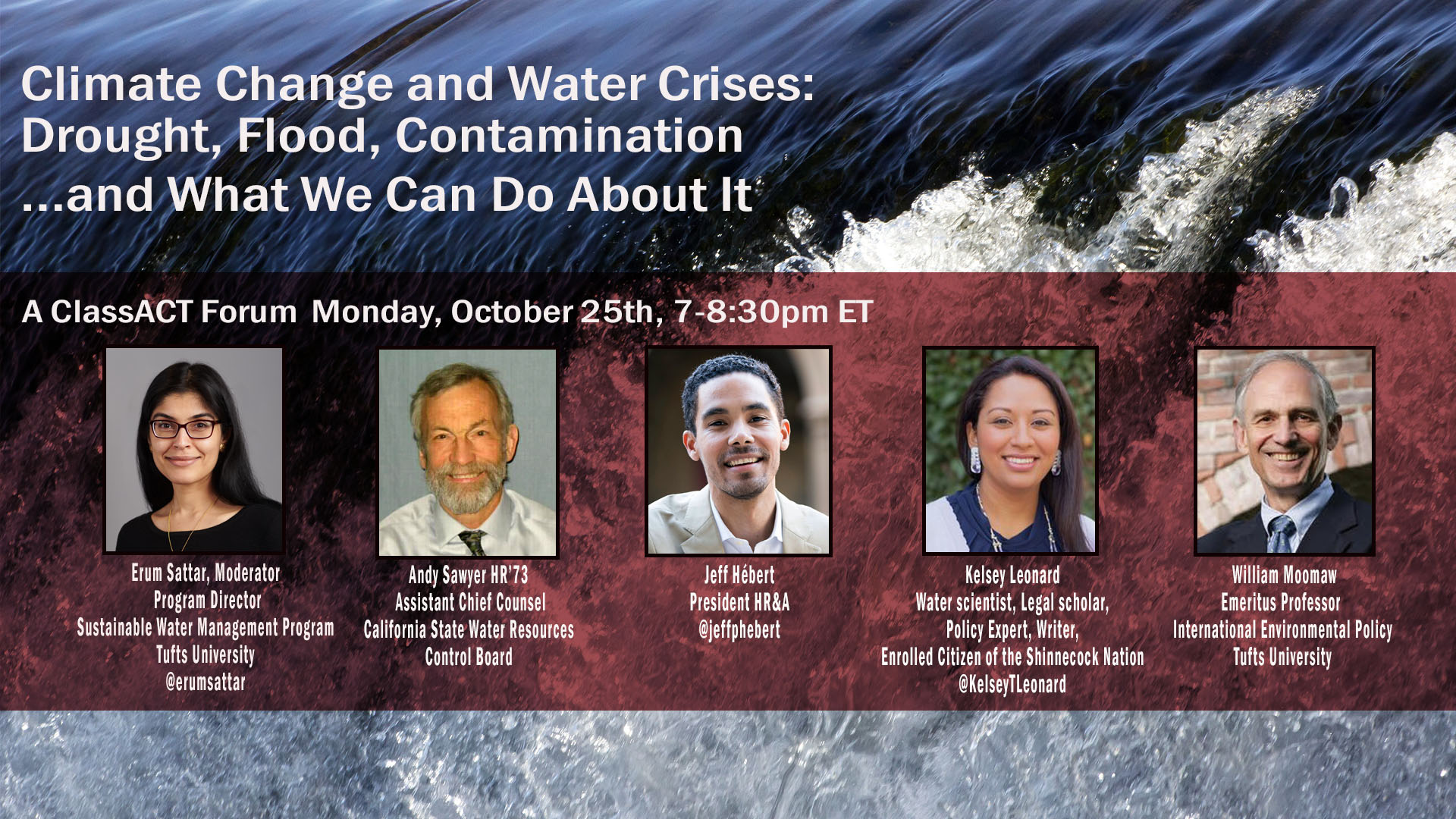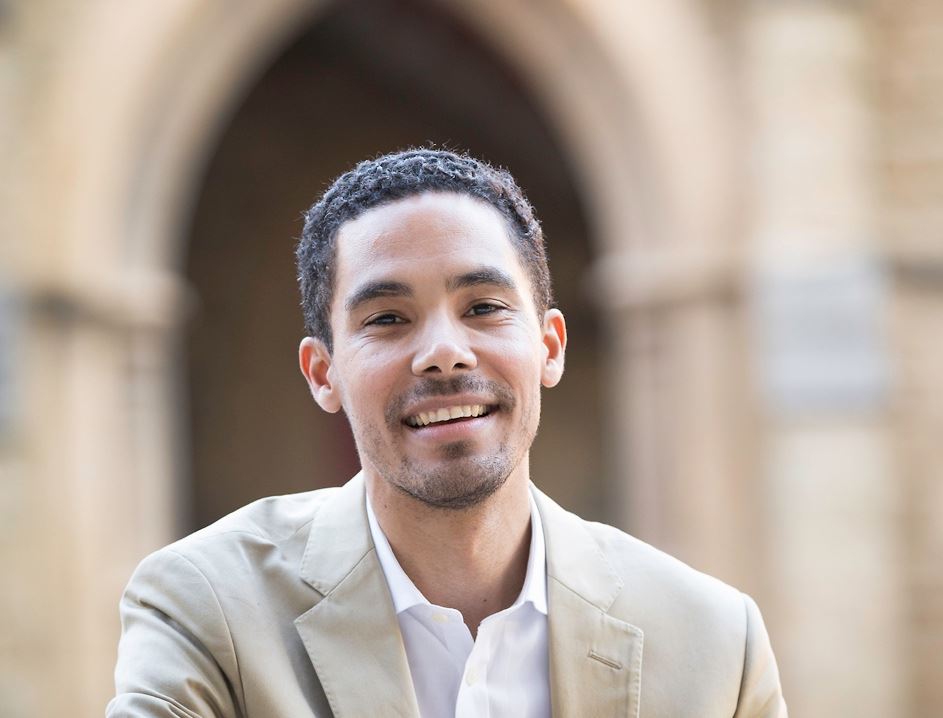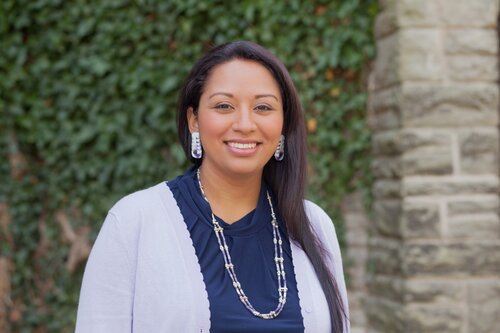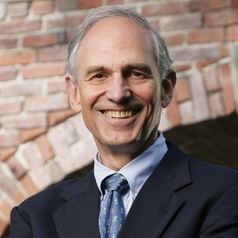- HOME
- Climate Change and Water Crises
CLIMATE CHANGE AND WATER CRISES: DROUGHT, FLOOD, CONTAMINATION … AND WHAT WE CAN DO ABOUT IT
Monday, October 25, 2021
7:00pm - 8:30pm ET


Human impact on the planet is being compared to the meteor that struck Earth and wiped out the dinosaurs – we have truly entered the Anthropocene. A changing climate acts first and foremost through the water cycle, which together with human demands are putting unprecedented stress on the reliable availability of water. Its amounts, timing, and quality for humans, other species, and ecosystems have been severely disrupted. Extreme weather events in the summer of 2021 alone run the gamut from wildfires in Siberia and the American West, to unprecedented rainfall events and floods in Germany, China, and the U.S. Gulf Coast, to sea snot (marine mucilage) in the Sea of Marmara off the coast of Turkey. These and other events impact water availability, quality, quantity, and timeliness around the world.
We bring together a panel of experts, moderated by Erum Sattar, Program Director of the Sustainable Water Management Program (SWM) at Tufts University, and including Andy Sawyer HR’73, Assistant Chief Counsel of the California State Water Resources Control Board, Jeff Hébert, President of HR&A, Kelsey Leonard, water scientist, legal scholar, policy expert, writer, and enrolled citizen of the Shinnecock Nation, and William Moomaw, Emeritus Professor of international environmental policy at Tufts University, to discuss these disparate and interrelated problems. Together, we aim to attain greater understanding of the immense challenges to global and local water security and to begin to chart future actions.
We have created 13 videos from this forum—one of the whole event, and 12 others, divided by topic. They are all available by clicking on the playlist in the YouTube video screen below. The playlist is very hard to see! You will find it along the top of the screen just to the right of the title of the forum. It looks like this ≡.
Click on the ≡ button. That will open a drop down menu. You can then scroll down the menu and choose individual videos to play.
RESOURCES FROM ZOOM FORUM CHAT
OUR MODERATOR AND PANELISTS
MODERATOR ERUM SATTAR
 Erum K. Sattar received her Doctorate in Juridical Sciences (S.J.D.) from Harvard University where her dissertation committee consisted of Professors Mark Tushnet, James Salzman and Amartya Sen. The late Professor John Briscoe was also a member of her committee. Her doctoral research spanning law and policy focused on issues of water federalism and trans-boundary water sharing in the Indus River Basin.
Erum K. Sattar received her Doctorate in Juridical Sciences (S.J.D.) from Harvard University where her dissertation committee consisted of Professors Mark Tushnet, James Salzman and Amartya Sen. The late Professor John Briscoe was also a member of her committee. Her doctoral research spanning law and policy focused on issues of water federalism and trans-boundary water sharing in the Indus River Basin.
At the Friedman School and the Tufts Institute of the Environment, Dr. Sattar leads and teaches in the multidisciplinary Sustainable Water Management Program (SWM) that draws together colleagues and disciplines from across Tufts University. Her current research is focused on the impact of climate change as it disrupts water availability and the legal and institutional structures that societies need to design to adapt to growing environmental stresses ranging across floods, a warming climate, and long-term droughts. Her work is centered on studying water both as a physical as well as a historically constructed shared and governed resource that has significant implications for economic development and political economy, food security, political systems and migration patterns, and the stability of ecosystems.
CALL TO ACTION:
A decade ago, Erum had her own water connection, and has obsessed over it ever since. She was standing at the Indus River Delta before it spills into the Arabian Sea. There's a massive barrage across the river made by the British when they ruled a united India - Erum looked to the left at the barrage and river, beautifully flowing, and then she looked to the the right. The delta was completely dry in high summer season. Poor marginal fishermen had existed in that delta, which had been dried out by the barrage and the diversions of the river.
Erum stressed the importance of having some kind of connection to water. That day at the Indus River Delta, Erum felt claimed by the river and water, and forged a spiritual connection that is now a part of who she is. She hopes people begin to feel where they are and make their own stories with water.
ANDY SAWYER HR73
.jpg) Andy Sawyer is an Assistant Chief Counsel at the State Water Resources Control Board (State Water Board) in Sacramento, California, where his responsibilities include managing the activities of the Office of Chief Counsel involving the State Water Board’s water right and drinking water programs. He has held his current position since 1988 and worked for the State Water Board since 1977. Before coming to the State Water Board, he had a clerkship with Justice Samuel J. Roberts of the Supreme Court of Pennsylvania.
Andy Sawyer is an Assistant Chief Counsel at the State Water Resources Control Board (State Water Board) in Sacramento, California, where his responsibilities include managing the activities of the Office of Chief Counsel involving the State Water Board’s water right and drinking water programs. He has held his current position since 1988 and worked for the State Water Board since 1977. Before coming to the State Water Board, he had a clerkship with Justice Samuel J. Roberts of the Supreme Court of Pennsylvania.
Andy is a former chair of the Environmental Law Section of Sacramento County Bar Association, and a former chair of the Environmental Law Section of the State Bar of California.
Andy received his J.D. in 1976 from the University of California at Berkeley and his A.B in 1973 from Harvard.
CALL TO ACTION:
- We need to invest in drinking water infrastructure and in fair rates for water, particularly in disadvantaged communities.
JEFF HÉBERT
@jeffphebert Jeff Hébert is president of HR&A Advisors and is a leader in climate resilience and community revitalization. He works with cities and organizations to develop strategies that mitigate future social, economic, and physical shocks and stresses. He is currently leading projects in New York City, Buffalo, Miami, New Orleans, Houston, Tulsa, Newark, and Washington, DC.
Jeff Hébert is president of HR&A Advisors and is a leader in climate resilience and community revitalization. He works with cities and organizations to develop strategies that mitigate future social, economic, and physical shocks and stresses. He is currently leading projects in New York City, Buffalo, Miami, New Orleans, Houston, Tulsa, Newark, and Washington, DC.
Mr. Hébert previously served Mayor Mitch Landrieu and the City of New Orleans in many capacities including as the First Deputy Mayor & Chief Administrative Officer, Chief Resilience Officer, and as Executive Director of the New Orleans Redevelopment Authority. He has been an adjunct faculty member at the Tulane University School of Architecture, is Co-Chairman of FUSE Corps, and serves on the Policy Advisory Board of The Reinvestment Fund, the Advisory Board of the ULI Center for Sustainability and Economic Performance, and the Boards of the Urban Design Forum, New Hope Housing, and the Greater New Orleans Foundation. Mr. Hébert holds a bachelor’s degree from New York University, a master’s degree in City Planning from the Massachusetts Institute of Technology, and is a graduate of the Achieving Excellence in Community Development program at Harvard University’s Kennedy School of Government.
Jeff was honored as a participant in the Future Leaders program (PIPA) of the Ministry of Foreign Affairs of France in 2018 where he studied climate change policy approaches in France. Jeff was honored in 2016 by GOOD magazine as one of 100 extraordinary individuals tackling global issues in creative ways.
Jeff joined HR&A Advisors in January 2019 in the firm’s New York office where he focuses on the intersection of climate change, real estate, and economies. Prior to joining HR&A, Jeff was Vice President at The Water Institute where he established an urban climate adaptation program including tools for cities and strategies for the built environment. Jeff formerly managed the day-to-day operations of New Orleans City Hall and oversaw the city’s development portfolio. He also led Mayor Landrieu’s award-winning blight reduction and climate adaptation programs.
Jeff returned home to Louisiana in the aftermath of Hurricane Katrina to lead Governor Kathleen Blanco’s long-term community recovery planning process. He also consulted on master planning projects for public sector clients in California and Texas. Jeff began his career in New York City working on the Downtown Brooklyn Redevelopment Plan.
CALL TO ACTION:
- We must focus our climate change activism on moving the conversation forward to action, and giving direct action as much play as policy and politics when we speak on climate.
- We've been lost on debating the science of climate change with no parallel track for providing direct action, devoting resources, finances, infrastructure to mitigate and help sustain our livelihoods.
- Now is the time to pivot to action, and take it up with our elected officials.
KELSEY LEONARD
 Dr. Kelsey Leonard is a water scientist, legal scholar, policy expert, writer, and enrolled citizen of the Shinnecock Nation. Dr. Leonard is an Assistant Professor in the Faculty of Environment at the University of Waterloo, where her research focuses on Indigenous water justice and its climatic, territorial, and governance underpinnings. Dr. Leonard seeks to establish Indigenous traditions of water conservation as the foundation for international water policymaking.
Dr. Kelsey Leonard is a water scientist, legal scholar, policy expert, writer, and enrolled citizen of the Shinnecock Nation. Dr. Leonard is an Assistant Professor in the Faculty of Environment at the University of Waterloo, where her research focuses on Indigenous water justice and its climatic, territorial, and governance underpinnings. Dr. Leonard seeks to establish Indigenous traditions of water conservation as the foundation for international water policymaking.
She represents the Shinnecock Indian Nation on the Mid-Atlantic Committee on the Ocean, which is charged with protecting America's ocean ecosystems and coastlines. She also serves as a member of the Great Lakes Water Quality Board of the International Joint Commission. Her regional ocean policy work in collaboration with Tribes, state, federal and fishery management council entities received a Peter Benchley Ocean Award for Excellence in Solutions.
Dr. Leonard received an A.B. in Sociology and Anthropology with honors from Harvard University, a MSc in Water Science, Policy and Management from the University of Oxford, a JD from Duquesne University, and PhD in Political Science from McMaster University. She has been recognized as a 30 under 30 world environmental leader by the North American Association for Environmental Education and a “Native American 40 Under 40” award recipient by the National Center for American Indian Enterprise Development. Her doctoral dissertation examined Indigenous water governance in the Great Lakes. For her research, she was also awarded one of the most prestigious postdoctoral awards in Canada, the Banting Postdoctoral Fellowship.
Dr. Leonard has been instrumental in safeguarding the interests of Indigenous Nations for environmental planning and builds Indigenous science and knowledge into new solutions for water governance and sustainable oceans. In collaboration with a global team of water law scholars, Dr. Leonard has published in Lewis and Clark Law Review on Indigenous Water Justice and the defining international legal principle of self-determination under the United Nations Declaration on the Rights of Indigenous Peoples.
Her recent scholarship explores legal personhood for water and her TEDTalk “Why lakes and rivers should have the same rights as humans” has nearly 3 million views. Dr. Leonard is a member of the National Ocean Protection Coalition Science Advisory Team, Global Alliance for the Rights of Nature Academic Hub and an affiliate of the Earth Law Center.
CALL TO ACTION:
- Find a way to forge a connection to a body of water near you: this could be a well in your backyard, a river down the road, and go have a visit with the water.
- When you visit a threatened place, you will feel the negative energy of the water, and this will inspire you to act.
- Think about how you can give back to it - don't view water as a resource for your consumption.
WILLIAM MOOMAW
 William Moomaw is Emeritus Professor of international environmental policy and founding director of the Center for International Environment and Resource Policy at Fletcher. He currently serves as co-director of the Global Development and Environment Institute at Tufts, which he co-founded. He received his B.A. degree in chemistry from Williams College and Ph.D. in physical chemistry from MIT. He had a 26-year career in chemistry and environmental studies at Williams College, where he directed the Center for Environmental Studies. He served as AAAS Science Fellow in the U.S. Senate, where he worked on legislation that successfully addressed ozone depletion, and on legislation responding to the 1973 energy crisis. He began working on climate change in 1988 as the first director of the climate program at World Resources Institute in Washington. He has been a lead author of five Intergovernmental Panel on Climate Change (IPCC) Reports. The IPCC shared the Nobel Peace Prize for its climate work in 2007. He is currently working on natural solutions to climate change with a focus on increasing carbon dioxide removal and sequestration by forests, wetlands and soils to compliment emission reductions from land use changes and replacing fossil fuels with zero carbon renewable energy.
William Moomaw is Emeritus Professor of international environmental policy and founding director of the Center for International Environment and Resource Policy at Fletcher. He currently serves as co-director of the Global Development and Environment Institute at Tufts, which he co-founded. He received his B.A. degree in chemistry from Williams College and Ph.D. in physical chemistry from MIT. He had a 26-year career in chemistry and environmental studies at Williams College, where he directed the Center for Environmental Studies. He served as AAAS Science Fellow in the U.S. Senate, where he worked on legislation that successfully addressed ozone depletion, and on legislation responding to the 1973 energy crisis. He began working on climate change in 1988 as the first director of the climate program at World Resources Institute in Washington. He has been a lead author of five Intergovernmental Panel on Climate Change (IPCC) Reports. The IPCC shared the Nobel Peace Prize for its climate work in 2007. He is currently working on natural solutions to climate change with a focus on increasing carbon dioxide removal and sequestration by forests, wetlands and soils to compliment emission reductions from land use changes and replacing fossil fuels with zero carbon renewable energy.
He chairs the board of directors of two climate science and policy organizations, The Climate Group North America and Woods Hole Research Center. He also serves on the boards of directors of The Nature Conservancy of Massachusetts, the Consensus Building Institute, Earthwatch Institute, and is on the National Advisory Boards of the Union of Concerned Scientists, and Young Voices for the Planet.
He and his wife, Margot, completed a zero net energy home in Williamstown MA in 2007 that produces sufficient solar electricity to meet all of its heating, lighting and appliance requirements while exporting surplus power to the grid. They have recently added more solar panels for a battery powered electric vehicle.


